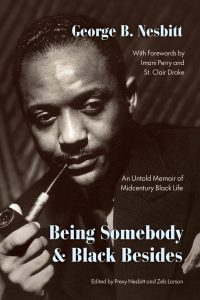Read an excerpt from “Being Somebody and Black Besides” by George B. Nesbitt
The late Chicagoan George Nesbitt could perhaps best be described as an ordinary man with an extraordinary gift for storytelling. In his newly uncovered memoir—written fifty years ago, yet never published—he chronicles in vivid and captivating detail the story of how his upwardly mobile Midwestern Black family lived through the tumultuous twentieth century. We’re pleased to share a brief excerpt from Being Somebody and Black Besides, available now.
Chapter 3: Learning to Be Somebody
When Papa and Mama left “down south,” neither was much of anybody, like thousands upon thousands of other young Negro men and women who made the same journey. Each was nobody much but wanting to be somebody, and this is why they picked up and pulled out. They left the poverty and the hard and ugly white ways of the south; they were pushed out by them. But they also gave up the warmth and goodness of the place and its people, their own people, and some whites too. They put behind them the huts and the big houses, the fields and roads they knew inside and out, and only, among all the places in God’s great world, and the people about them who knew them inside and out, their kin folk, those “like a brother or sister,” and the whites, those watching out for them and those they had learned to watch out for. It is not easy for people who have nothing and know little to turn their backs on the people who are theirs and the only places they know. Something has to draw them away.
So there was something which was pulling them on. It was not the “bright lights” of the city, for Pulaski, Illinois, where Papa and Mama first stopped, was a country town, cotton country besides, and they soon moved on. They were not simply following after their relatives either. Each left behind close kinfolk in and about Pulaski, and neither had them in Champaign ahead of them. No, it was being done with being nobody much and wanting to become somebody that picked them up and put them down in Champaign.
My memories make this plain for me. For as Mama and Papa talked, with each other, other folks, and to us, the talk was full of “nobody” and “somebody.” This fellow was a “nobody” but that one would be “somebody” someday. A grown- up somebody had a job, worked hard, cared for his family— or, as a woman, helped the husband. A somebody coming along went to school and made a serious business of it.
Learning was the route to being somebody. For Mama, how to cook in a Northern style but with the seasonings of the south; manage not just the cooking but the whole dining operation on the campus, for better pay; handle her own household with enough prudence always to keep a sack under her mattress out of which school books could be bought; and now and then to learn something new along with the children. For Papa there was no “Man” in Champaign to crop for but housecleaning skills to learn and how to bargain and contract with many people and belong to none of them. For us children, there were the wisdom and ways of the Bible to learn at home, at Mama’s church and Papa’s too, from the neighbors, and at the feet of this Defender customer and that one. And there was school. “Go on to school so you can be somebody,” everybody who was anybody kept saying to us. “What grade will you be in next fall?” paper customers would ask during the summer. “Get an education and nobody can take it from you, folks would say over and over again. This was the way to prepare for a hard world.
So it was good to get away from Poplar Street as it started downhill and up on Tremont Street, near the countryside, church, and school.
George Nesbitt (1912-2002) was a lawyer and civil rights activist.
Being Somebody and Black Besides is available now from our website or your favorite bookseller.
